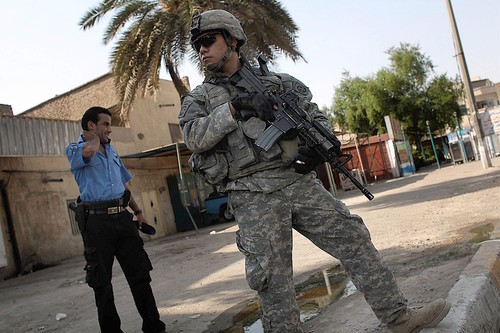This photo from the Chicago Tribune inadvertently says a lot about what’s wrong with the “Stand up/Stand down” strategy (dare we say myth) in Iraq.
It is in many ways a bad photo: an ordinary street scene made to look off-kilter from the oddly tilted camera; the focus is divided to both left and the right, which allows the eye to wander aimlessly through the distant, featureless background; not much is happening. This seems to be an amateur snapshot of a nonevent.
One reason it made it into the Chicago paper is suggested by the caption: “On patrol. Army Sgt. Ezequiel Mora of DeKalb patrols a police checkpoint Sunday in Baghdad.” Ok, he’s a local boy. And sure enough, the picture looks posed. Foot up, body turned toward the viewer, gun fully displayed, looking intently beyond the lens–this is what he might be told to do in a portrait studio. And now the context makes more sense: as in a studio, there should be nothing happening, and the actual street scene is merely a backdrop like a fake row of books. Unlike some of the more realistic photographs of soldiers caked with dirt, sweat, and fear as they inch along a wall while under fire, this guy is a perfectly uniformed action figure. Like GI Joe, his mission is to look the part.
If he were the only guy in the picture, that might be the end of it. But look at the other guy. He is one of the cops at the police checkpoint. And what a cop. In contrast to the heavily armored hoplite in front of him, this guy is wearing the thin cotton/polyester shirt you’d see on the street in Maybury. He’s also lightly armed. Most important, he really looks like a small town cop: hand on the back of the neck–got a crick there, maybe–puzzling about some exceedingly local dilemma. He’s built not for action but for talking, cajoling, compromising, and moving things along, all the while not quite up to the job and better suited for it for that. We’re looking at Barney Fife in Baghdad.
The comic contrast between the two figures might be the end of it, except that the rest of the caption places the photograph within a strategic context: “Prime Minister Nouri al-Maliki said U.S. commanders must work harder to avoid civilian casualties.” So, those patrolling the checkpoints have been a little rough, and now the choice is between two bad options: ineffectual police work such that U.S. troops have to patrol the police checkpoints (shouldn’t the police be able to do that, so that the troops could be used elsewhere?) and the use of excessive force by those troops.
The photograph goes further still: it shows us, first, that the relationship between the police and the troops is backwards, and, second, that the whole operation has gone tilt. In a modern civil society, citizens should encounter not military troops but the police. The troops should be way in the background as the major part of the state’s monopoly on force and used only for extraordinary threats such as invasions and natural disasters. Equally important, most of the time police should be a lot like the cop in the photograph: not paramilitary swat teams but ordinary guys who know the people in the neighborhood and are there to solve small problems. In Iraq, however, it looks like nothing can be done to scale. Citizens encounter troops who can’t help but be dangerous, while the troops are more likely to be trigger happy because they have the problem of having the none-too-reliable Iraqi police covering their backs. And I don’t see Andy Griffith anywhere in the picture.
Photograph by Spencer Platt/Getty, August 26, 2007.

[…] a growing Iraqi police force and tribes of “provincial volunteers.” That the police force is beleaguered and the volunteers bear a striking resemblance to vigilante groups doesn’t seem to matter, for […]
i have been watching GI Joe cartoons since childhood. a year ago, i was thinking why Hollywood has not yet created a movie version of GI JOE. I am very happy now that i can watch a movie version of my favorite cartoon show.
i am a big fan of GI Joe. it was originally a cartoon series that i always watched when i was just a kid. i also collected many GI Joe action figures.
i love watching GI Joe, both the cartoon series and the movie. I am hoping that they would make a sequel. |